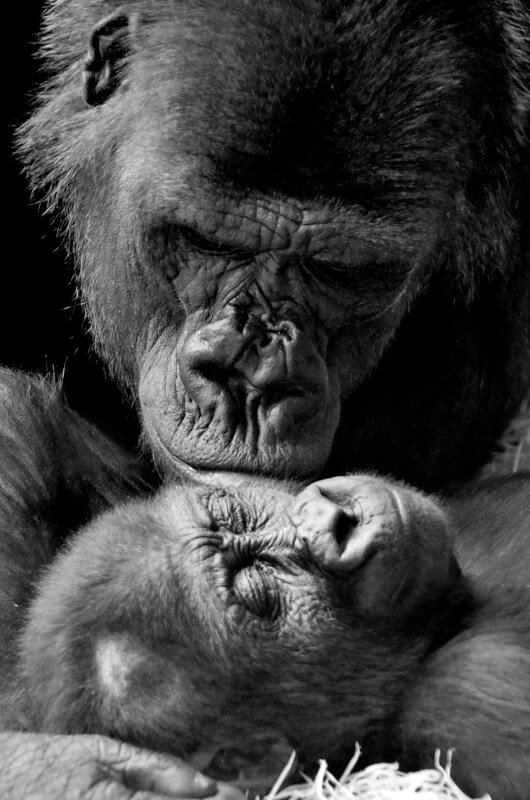Are you interested in learning about how to create a safe and supportive social environment for primates? In this article, we will explore the importance of providing a nurturing space for primates to interact and thrive. By understanding their social needs and implementing effective strategies, we can contribute to their overall well-being. Join us as we delve into the fascinating world of primates and discover how we can make a positive impact on their lives.
Understanding Primate Social Behavior
Primate social behavior is a fascinating and complex subject that plays a crucial role in the lives of these remarkable animals. By understanding the intricacies of their social interactions, we can provide them with an environment that meets their social needs and promotes their well-being.
Importance of social environment for primates
For primates, social interaction is not just a luxury, but a necessity. It is an integral part of their development, communication, and overall mental and emotional well-being. Primates, like humans, are social beings that thrive in the company of others.
Being in a supportive social environment helps primates fulfill their social and emotional needs, reduce stress, and even enhance their overall health. It is through social interactions that primates learn important skills such as communication, problem-solving, and social hierarchy.
Typical social structures of primates
Primates exhibit a wide range of social structures, varying from species to species. Some primates, such as lemurs, have a solitary lifestyle and prefer minimal social interactions, while others, like baboons, form highly structured and complex social hierarchies within large groups.
In general, many primates exhibit a system of social organization based on dominance hierarchies. These hierarchies determine the access to resources, mating opportunities, and the overall social structure within the group. Understanding the specific social structure of each primate species is crucial for creating an appropriate environment that supports their social needs.
Factors influencing primate social behavior
Several factors influence the social behavior of primates. These include species-specific behaviors, environmental factors, and individual experiences. Careful observation and study of these factors allow us to create an environment that caters to the specific social needs of each primate in our care.
Factors such as age, sex, and individual experiences can influence how primates interact with each other. For example, male-male competition for mates is common in many primate species, while female-female cooperation is observed in others. Additionally, the availability of resources, the size of the social group, and the presence of predators can also impact primate social behavior.
Creating Physically Secure Enclosures
Creating physically secure enclosures is of the utmost importance when caring for primates. These enclosures not only protect the primates from potential dangers but also ensure they have the freedom to move and explore within a safe environment.
Choosing appropriate enclosure materials
When designing enclosures for primates, it is essential to choose materials that are both durable and safe for the primates. Strong and non-toxic materials, such as stainless steel, are often used for enclosures to prevent escape and avoid injuries. It is crucial to avoid materials that can be easily chewed or broken, as primates are highly intelligent and resourceful animals.
Designing barriers to prevent escapes
To create a physically secure enclosure, it is important to design barriers that prevent escapes. The enclosure should have walls and fences that are high enough to discourage climbing or jumping over. Additionally, sturdy mesh or bars should be used to prevent squeezing or reaching through the enclosure.
Regular maintenance and inspections of the enclosure are essential to ensure that there are no weak spots or wear and tear that could potentially lead to an escape. Swift and effective repairs should be conducted whenever necessary to maintain the security of the enclosure.
Providing ample space for movement and exploration
Primates are highly active animals that require ample space for movement and exploration. The enclosure should be spacious enough to allow the primates to engage in natural behaviors such as climbing, swinging, and running. A lack of space can lead to stress, boredom, and even physical health problems.
Enrichment structures such as climbing frames, ropes, and hammocks should be provided to encourage physical activity and mimic natural behaviors. It is important to regularly assess the layout of the enclosure to ensure that it remains stimulating and conducive to the well-being of the primates.

Ensuring Psychological Well-being
In addition to creating physically secure enclosures, ensuring the psychological well-being of primates is vital. By promoting social interactions, providing enrichment activities, and managing stress and anxiety, we can help primates lead fulfilling lives.
Promoting social interactions
Since primates are social animals, it is essential to promote social interactions within their environment. This can be achieved by housing compatible individuals together in groups that reflect their specific social structure.
By allowing primates to form and maintain social bonds, we are facilitating the fulfillment of their social needs. Providing opportunities for social grooming, play, and communication helps strengthen bonds and contributes to their overall psychological well-being.
Providing a variety of enrichment activities
Enrichment activities play a crucial role in providing mental stimulation and preventing boredom for primates. It is important to offer a variety of enrichment options that cater to their natural behaviors and interests.
Enrichment activities can include puzzle feeders, foraging opportunities, and the introduction of new objects or scents regularly. These activities encourage problem-solving, promote exploration, and mimic the challenges encountered in the wild.
Managing stress and anxiety
Primates, like humans, can experience stress and anxiety. It is crucial to manage these emotions to ensure their psychological well-being. Encouraging a low-stress environment by avoiding loud noises, sudden disruptions, or overcrowding is essential.
Providing secure hiding places or quiet areas within the enclosure allows primates to retreat and regroup when they feel overwhelmed. Additionally, positive reinforcement training techniques can be employed to mitigate stress and anxiety by redirecting their focus and rewarding desired behaviors.
By implementing strategies to promote social interactions, providing a variety of enrichment activities, and managing stress and anxiety, we can ensure the psychological well-being of primates under our care.
Facilitating Natural Social Dynamics
Facilitating natural social dynamics is crucial for maintaining the social well-being of primates. By understanding their group composition and dynamics, avoiding overcrowding, and introducing new individuals properly, we can create an environment that supports their natural social behaviors.
Group composition and dynamics
Each primate species has its own unique social structure and dynamics. Some species form cohesive family groups, while others live in multi-male and multi-female groups. Understanding the specific social needs of each primate species is essential for creating compatible groupings.
Factors such as age, sex, and individual temperament should be taken into consideration when forming social groups. Monitoring the interactions within the group and providing adequate resources and space is crucial for maintaining a harmonious social environment.
Avoiding overcrowding
Overcrowding can lead to increased stress, competition for resources, and aggression within primate groups. It is essential to provide ample space for each individual to ensure their well-being.
Careful assessment of the enclosure’s capacity and population is necessary to avoid overcrowding. Regular observation and monitoring of the primate group dynamics can help identify any signs of tension or potential overcrowding, allowing for prompt intervention and necessary changes.
Introducing new individuals
Introducing new individuals to an established primate group requires careful planning and consideration. It is important to assess the compatibility between the existing group members and the new individual to reduce the likelihood of conflicts and stress.
Gradual introductions and supervised interactions should be conducted to allow the primates to become familiar with each other and establish social bonds. This process may require several stages and adjustments to ensure a smooth and successful integration.
By facilitating natural social dynamics through appropriate group compositions, avoiding overcrowding, and implementing proper introductions, we can create a supportive environment that aligns with the natural behaviors and needs of primates.

Implementing Positive Reinforcement Training
Positive reinforcement training is a valuable tool in primate care that enhances communication, builds trust and cooperation, and mitigates aggression and dominance behaviors. By implementing positive reinforcement techniques, we can establish a positive and cooperative relationship with the primates under our care.
Using positive reinforcement techniques
Positive reinforcement involves rewarding desired behaviors with incentives such as food, praise, or play. By reinforcing behaviors we want to encourage, such as cooperation during veterinary procedures or the completion of a training task, we can effectively communicate expectations and establish a positive association with these activities.
Building trust and cooperation
Trust is essential in primate care, as it promotes a cooperative relationship between the primates and their caregivers. By using positive reinforcement techniques consistently and with respect, we can build trust and create an environment where the primates feel safe and secure.
Building trust involves understanding the individual needs and preferences of each primate and allowing them to participate voluntarily in training sessions. Developing a bond based on trust and cooperation facilitates daily care routines, medical procedures, and behavioral management.
Mitigating aggression and dominance behaviors
Aggression and dominance behaviors can be challenging in primate social groups. Positive reinforcement training techniques can help mitigate these behaviors by redirecting the primates’ focus towards more desirable behaviors and rewarding them accordingly.
Promoting a positive and cooperative atmosphere within the group helps reduce competition and aggression. By fostering positive relationships and providing sufficient resources and space, we can minimize stress and create a more harmonious social environment.
Implementing positive reinforcement training techniques can significantly contribute to the well-being and overall behavior management of primates. By establishing trust, promoting cooperation, and mitigating aggression, we can create a positive and supportive environment for the primates under our care.
Ensuring Access to Nutritious Diet
Providing primates with a nutritious diet is crucial for their overall health and well-being. Understanding their dietary requirements, offering a balanced and varied diet, and providing foraging opportunities are important aspects of ensuring their nutritional needs are met.
Understanding dietary requirements
Each primate species has specific dietary requirements based on their natural diet in the wild. It is important to understand the nutritional needs of the primates under our care and provide a diet that closely resembles their natural food sources.
Consulting with veterinarians, nutritionists, and other experts in primate care can help develop a comprehensive and balanced diet plan. This plan should be regularly reviewed and updated to ensure it meets the changing needs of the primates throughout their lifespan.
Providing a balanced and varied diet
A balanced and varied diet is essential to prevent nutritional deficiencies and promote overall health. A diet consisting of a mix of fruits, vegetables, proteins, and carbohydrates ensures that the primates receive the necessary nutrients for their well-being.
Offering a variety of food items allows primates to experience different tastes, textures, and nutritional benefits. By providing a diverse range of food options, we can mimic their natural foraging behaviors and provide a more stimulating and enriching feeding experience.
Offering foraging opportunities
Foraging is an important natural behavior for primates, as it provides mental stimulation and exercise. By offering foraging opportunities, we can enrich their feeding experience and promote their natural foraging instincts.
There are various ways to provide foraging opportunities, such as hiding food in puzzle feeders or scattering it throughout the enclosure. These activities encourage problem-solving and engagement, while also increasing the time spent foraging, which benefits the overall well-being of the primates.
By understanding their dietary requirements, offering a balanced and varied diet, and providing foraging opportunities, we can ensure that the primates under our care receive the necessary nutrients for their health and well-being.

Maintaining Proper Health and Veterinary Care
Maintaining proper health and veterinary care is vital for the well-being of primates. Regular health check-ups, disease prevention and treatment, and monitoring reproductive health are essential aspects of providing comprehensive healthcare for these animals.
Regular health check-ups
Regular health check-ups by qualified veterinarians are crucial in promoting the overall health of primates. These check-ups involve physical examinations, monitoring vital signs, and assessing the general well-being of the individual.
Regular health check-ups also allow for the early detection and treatment of any health issues or concerns. Vaccinations, deworming, and routine blood tests are often conducted during these check-ups to ensure the primates are protected against common diseases and parasites.
Preventing and treating diseases
Preventing diseases is key in maintaining the health of primates. Implementing proper biosecurity measures, such as regular cleaning and disinfection of enclosures, minimizing exposure to pathogens, and quarantine procedures for new arrivals, can help prevent the spread of diseases.
In the event of an illness or injury, prompt medical attention and treatment are essential. Veterinarians experienced in primate medicine should be consulted, and treatment plans should be implemented accordingly. Administering medication and providing appropriate supportive care can aid in the recovery and well-being of sick or injured primates.
Monitoring reproductive health
For primates involved in breeding programs, monitoring reproductive health is essential. Regular assessments and examinations should be conducted to ensure the reproductive system remains healthy and functional.
Reproductive health monitoring includes monitoring menstrual cycles, conducting ultrasounds, and assessing hormone levels. This information helps determine the fertility and overall reproductive fitness of the primates, allowing for appropriate breeding management and intervention when necessary.
By prioritizing regular health check-ups, preventing and treating diseases, and monitoring reproductive health, we can ensure that the primates under our care receive the necessary healthcare to maintain their overall well-being.
Implementing Environmental Enrichment
Environmental enrichment plays a crucial role in promoting the well-being and natural behaviors of primates. By providing naturalistic habitats, offering climbing structures and toys, and regularly rotating and changing enrichment, we can create a stimulating and enriching environment for primates.
Providing naturalistic habitats
Naturalistic habitats aim to replicate the natural environment and conditions in which the primates would live in the wild. This includes the provision of vegetation, natural substrates, and hiding places that mimic their natural habitat.
By creating a habitat that closely resembles their natural environment, we can provide enrichment opportunities and promote natural behaviors such as climbing, foraging, and exploring. This contributes to their overall well-being and mental stimulation.
Offering climbing structures and toys
Climbing structures and toys play an important role in promoting physical exercise, mental stimulation, and natural behaviors. Providing climbing frames, ropes, platforms, and swings allows primates to engage in their natural climbing and swinging behaviors.
Toys that encourage exploration and problem-solving, such as puzzle feeders or treat-dispensing toys, provide mental stimulation and prevent boredom. It is important to regularly assess and rotate the toys to maintain novelty and keep the primates engaged.
Rotating and changing enrichment regularly
Regularly rotating and changing enrichment items is crucial to prevent habituation and maintain the effectiveness of enrichment activities. Primates are intelligent and curious animals that benefit from exposure to new and novel forms of enrichment.
By regularly introducing new objects, scents, or food items, we can stimulate the primates’ senses and maintain their interest. It is important to observe their response to different enrichment activities and adjust accordingly to ensure they remain engaged and stimulated.
Implementing environmental enrichment through naturalistic habitats, climbing structures and toys, and regular rotation and changes in enrichment helps create a stimulating and enriching environment that supports the natural behaviors and well-being of primates.

Implementing Socialization Opportunities
Socialization opportunities are crucial in providing primates with opportunities for companionship and interaction. By arranging supervised socialization sessions, ensuring compatibility between individuals, and balancing individual and group interactions, we can promote their social well-being.
Arranging supervised socialization sessions
Supervised socialization sessions allow primates to interact and form social bonds in a controlled and safe environment. These sessions should be conducted under the supervision of experienced caregivers to ensure the interaction remains positive and stress-free.
Careful observation of the primates’ behaviors during these sessions is essential to ensure compatibility and prevent conflicts. Gradual introductions and monitoring of the individuals’ reactions help in determining the success and appropriateness of the socialization.
Ensuring compatibility between individuals
Compatibility between individuals is crucial for promoting positive social interactions. The temperament, age, and social hierarchy of each primate should be considered when forming social groups or arranging socialization sessions.
Observing the primates’ behaviors and introducing them gradually can help assess compatibility. This process may involve trial periods and adjustments to ensure a harmonious dynamic within the group.
Balancing individual and group interactions
Balancing individual and group interactions is important to cater to the needs of each primate. Some individuals may thrive in constant social interactions, while others may prefer more solitary time.
Providing opportunities for both individual and group interactions allows primates to fulfill their social needs according to their preferences. This can be achieved by providing separate areas or enclosures for solitary individuals or scheduling dedicated group playtimes.
By implementing socialization opportunities through supervised sessions, ensuring compatibility between individuals, and balancing individual and group interactions, we can promote the social well-being and overall happiness of primates under our care.
Ensuring Adequate Staff Training and Expertise
Adequate staff training and expertise are crucial in providing optimal care for primates. By educating staff on primate behavior and needs, training them in positive reinforcement techniques, and conducting regular evaluations and professional development, we can ensure the well-being of the primates and maintain high standards of care.
Education on primate behavior and needs
Primate behavior and needs can be complex and require a solid understanding to provide appropriate care. Educating staff on primate species-specific behaviors, social structures, and natural diets helps them make informed decisions and promote the well-being of the primates.
Providing training sessions, workshops, and access to educational resources enables the staff to expand their knowledge and stay updated on current best practices. Regular communication and discussions regarding primate care can help foster a learning environment among the staff.
Training in positive reinforcement techniques
Training staff in positive reinforcement techniques is essential for effective communication and behavior management with primates. This training equips staff with the necessary skills to encourage and reinforce desired behaviors while mitigating unwanted behaviors.
Positive reinforcement training techniques should be based on trust, respect, and cooperation. Staff members should receive thorough training on these techniques, including correct timing, use of appropriate rewards, and positive reinforcement protocols tailored to the individual primates.
Regular staff evaluations and professional development
Regular staff evaluations and professional development opportunities contribute to the ongoing improvement of primate care. Evaluations can help identify areas for growth and improvement, while professional development opportunities provide staff with the chance to expand their skills and knowledge.
By conducting regular performance evaluations, recognizing achievements, and providing constructive feedback, staff members are encouraged and motivated to continuously improve their skills and care practices. Access to workshops, conferences, and continued education programs further supports their professional development.
By ensuring adequate staff training and expertise through education on primate behavior and needs, training in positive reinforcement techniques, and regular staff evaluations and professional development, we can consistently provide high-quality care for the primates under our responsibility.
In conclusion, creating a safe and supportive social environment for primates involves an in-depth understanding of their social behavior, the implementation of physically secure enclosures, ensuring their psychological well-being through social interactions and enrichment, facilitating natural social dynamics, implementing positive reinforcement training, ensuring access to a nutritious diet, maintaining proper health and veterinary care, implementing environmental enrichment, arranging socialization opportunities, and ensuring the staff receives adequate training and expertise. By addressing these comprehensive aspects, we can ensure that primates under our care can live fulfilling and healthy lives.



